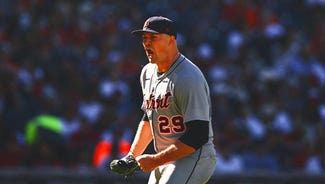
Tigers learn tough lesson from sweep
Blame it on A-Rod. That’s the default position for all postseason losers, isn’t it?
If Alex Rodriguez and the Yankees had extended the Tigers beyond four games in the American League Championship Series, then maybe the Tigers would have been sharper in the World Series.
That’s one theory, anyway.
The Tigers had a wide range of opinions on the impact of their five-day layoff after the Giants completed their sweep of the World Series on Sunday, winning Game 4 in 10 innings, 4-3.
But really, this goes deeper than the layoff, and deeper than reliever Octavio Dotel’s claim that the Tigers need to be more “pumped up.”
A lack of passion was not the Tigers’ problem in the World Series. No, their problem was a lack of diversity, and I don’t mean in the composition of their roster.
The Giants swept the Series with dominant pitching, suffocating defense, big ball, little ball, whatever kind of ball was required. The Tigers mostly pitched well, allowing only 16 runs in the four games. But everything else was lacking.
The Tigers’ slugging, one-dimensional offense produced only a .159 batting average and .489 OPS, averaging 1.5 runs per game. Their defense, while less of an issue than it had been for most of the regular season, paled in comparison to the Giants’ defense, which was a difference-maker, a reflection of their players’ superior athleticism and speed.
Here’s the question, the one to which we’ll never know the answer: Would the Tigers have stood a better chance if they had played five, six or seven games in the ALCS, then carried that energy into the Series?
Sorry, I still find it difficult to believe that the Tigers went down two games to none with Justin Verlander facing Barry Zito in Game 1 and Doug Fister facing Madison Bumgarner in Game 2.
True, the Tigers didn’t hit lefties well in the regular season. True, Zito and Bumgarner were quite good. But a split in San Francisco seemed likely when the Series began, a 2-0 lead for the Tigers possible.
Instead, the Giants won both games.
Tigers first baseman Prince Fielder refused to cite the layoff as an excuse, saying of the ALCS, “What were we supposed to do, lose three?”
Dotel, meanwhile, pointed out that the Tigers worked out all five days between series and played two simulated games against minor leaguers who flew at club expense from Lakeland, Fla., to Detroit.
The Tigers’ more rigorous preparation was a reaction to their five-game defeat after a six-day layoff in the 2006 World Series. Management, Dotel said, “did all they needed to do for us to be in the competition.”
Third baseman Miguel Cabrera, however, said that the layoff was indeed disruptive.
“Right now we can say yes, a little bit, because we never found our game, never found our best baseball,” Cabrera said.
“To be honest, we played great in Oakland. We (won) tough games in New York. Sitting for five days, seeming, like, too relaxed to play a World Series, I think it was not the right way to finish. We tried. We tried hard. But we were never able to finish and play our game.”
Verlander added: “It kind of sucks to go through pretty much the exact same scenario that we did in 2006. But we did everything we could to stay in sync, keep our team clicking. We got outplayed. Whether that had anything to do with the time off, I don’t know.”
So, what the heck was it then, other than the Giants pitching so well?
The Tigers missed Victor Martinez’s passion — Fielder and Cabrera care deeply, but give off a less urgent vibe. Emotional players such as the Giants’ Hunter Pence, though, are rare — and frankly, not always necessary.
The greater issue is that the Tigers offensively were somewhat like the Yankees, built for power and little more. The team willingly sacrificed defense for offense, and yet the offense was not the behemoth that many expected, finishing only sixth in the AL in runs.
Leyland, in his pre-game meeting with the FOX broadcasters Sunday night, said that the Tigers would have won 95 games in the regular season if their offense had produced to its expected level.
“What you’re seeing right now,” Leyland added, “is the reason we won 88 instead of 95.”
Martinez, returning from knee surgery, will replace Delmon Young, a potential free agent, on the 2013 roster. The Tigers need at least one more athletic outfielder to go with Austin Jackson — and maybe two, depending upon how they view Andy Dirks and Avisail Garcia.
A high-energy leadoff type at shortstop, someone like a young Rafael Furcal, also would help. Jhonny Peralta, while a respectable player, is a typical Tiger — limited range, low on-base percentage, decent power.
Athletic, versatile offensive players are not easy to find. But clearly, the Tigers need to update their style.
While the AL has dominated interleague play the past nine seasons, the NL now has won three straight World Series. Part of it is that the recent NL champions were better suited for a less power-laden era, more capable of playing a well-rounded game.
“Everybody in baseball knows that’s what you have to do,” Tigers pitcher Max Scherzer said. “It’s a three-phase game — pitching, offense and defense. You go back and look at all the World Series winners, they all do that. I don’t think that’s a lesson we learned. I think that’s a fact within baseball.”
Well, if it’s a fact, then it’s a fact that the Tigers at least partly ignored. The team still had a hugely successful season, winning the AL Central, beating the Athletics and Yankees in the playoffs, reaching the World Series. But let the Tigers’ final memory of 2012 serve as a springboard to a better future.
The layoff explained only so much. The Tigers got beat by a better team.










